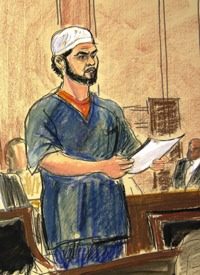
One of the most dramatic moments in the 2008 election cycle occurred almost a year and a half before Election Day, during a South Carolina debate among GOP presidential contenders. Ron Paul suggested that U.S. foreign policy was a “major contributing factor” to the terrorists’ motivation to attack us on 9/11. “Have you ever read the reasons they attacked us?” he asked. “They attacked us because we’ve been over there; we’ve been bombing Iraq for ten years.”
Rudy Giuliani, eager to defend U.S. interventionism, interjected, “That’s really an extraordinary statement … that we invited the attack because we were attacking Iraq. I don’t think I’ve heard that before, and I’ve heard some pretty absurd explanations for September 11th.”
If Giuliani was reluctant to believe Paul, perhaps he would be more likely to believe Faisal Shahzad, the man accused of trying to set off a bomb in Times Square. Appearing in federal court on June 21, Shahzad “was cool and collected when he said he wanted ‘to plead guilty and a hundred times more’ for the terror plot, and that if the U.S. did not get out of Iraq and Afghanistan, halt drone attacks and stop meddling in Muslim lands, ‘we will be attacking U.S.,’” according to a WCBS-TV report.
The Associated Press writes that Shahzad “went to court with a prepared statement.” U.S. District Judge Miriam Cedarbaum, however, refused to let him read it, asking him to recount events from memory. He obliged, providing “chilling details about how he trained with the Pakistani Taliban to build bombs, then returned to the U.S. to launch an attack that would avenge attacks on Muslims by U.S. forces overseas,” says the AP.
“I consider myself … a Muslim soldier,” he said, according to the AP.
Shahzad told the story of how he traveled to Pakistan in 2009, whereupon he joined the Pakistani Taliban, who provided him with explosives training and cash to complete his attack on Times Square. He said he tried to explode three different bomb components — a bomb made from fertilizer, plus propane tanks and gas canisters — but they all failed to ignite, whereupon he simply went home. He was arrested trying to leave the country two days later.
Then came this exchange, as reported by the AP:
[The judge] also pressed him on how he could target U.S. civilians if his goal was to retaliate against U.S. forces, asking of the potential in Times Square that night, “Did you look around to see who they were?”
“Well, the people select the government,” Shahzad said. “We consider them all the same. The drones, when they hit…”
Cedarbaum interrupted again: “Including the children?”
Shahzad answered: “Well, the drone hits in Afghanistan and Iraq, they don’t see children, they don’t see anybody. They kill women, children, they kill everybody. It’s a war, and in war, they kill people. They’re killing all Muslims.”
Later, he added: “I am part of the answer to the U.S. terrorizing the Muslim nations and the Muslim people. And, on behalf of that, I’m avenging the attack. Living in the United States, Americans only care about their own people, but they don’t care about the people elsewhere in the world when they die.”
It’s hard to argue with Shahzad’s logic. If it acceptable for the U.S. government to kill innocent people in foreign countries, why is it not acceptable for the dead foreigners’ countrymen to kill innocent Americans on our own soil?
Of course, neither is acceptable, but the latter follows from the former just as surely as night follows day, and that is what Paul was trying to explain to Giuliani and the rest of the American people.
U.S. interventionism is not the sole cause of terrorism against Americans, but as Paul said, it is a “major contributing factor” to it. If Washington were not meddling in Muslim countries, in the process murdering thousands of innocent Muslims and keeping others under the thumb of U.S.-approved dictators, radicals such as Osama bin Laden and the Taliban would have a much more difficult time attracting people to their cause — people like Shahzad, who had lived in the United States for 12 years, seemingly enjoying the American way of life, and becoming a U.S. citizen last year.
Americans can choose to go on believing the fantasy that Islamic terrorists hate us for our freedom, or they can take the word of an admitted terrorist that they hate us for what our government does to their coreligionists (and Shahzad is far from the first terrorist to make this claim).
The Founding Fathers’ advice to avoid foreign entanglements is looking wiser by the day.
Photo of Faisal Shahzad: AP Images



